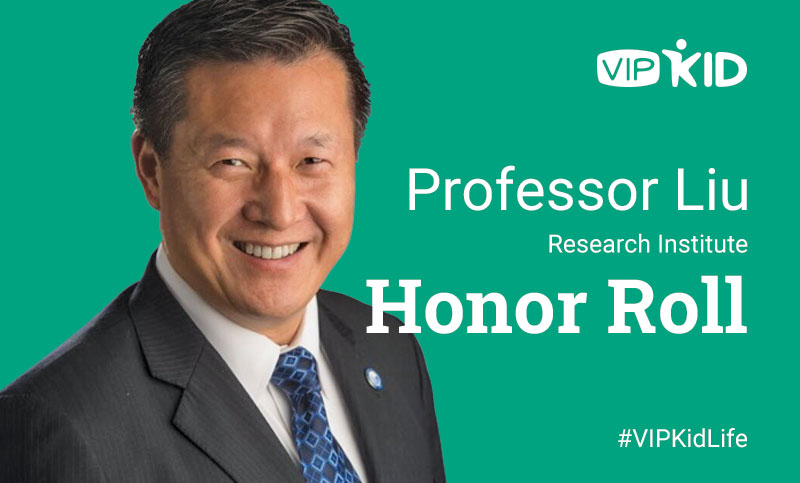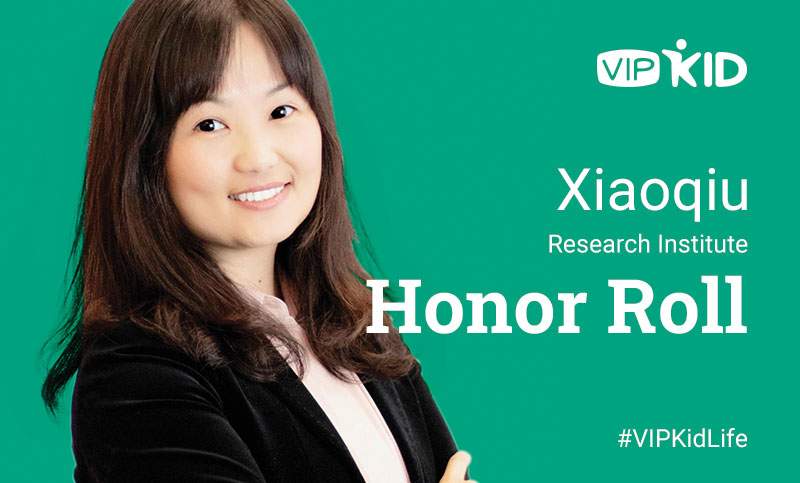Ready to start teaching English online?
Teach with VIPKidCreating immersive academic solutions that enable teachers to engage and excite our students is made possible with our Research Institute leaders propelling our curriculum development.
VIPKid’s proprietary curriculum has been developed in-house, with a focus on a flipped classroom education model. Our lessons are created to cater to the needs of teachers and learners by using innovative pedagogical approaches and linking to multiple language and educational standards. The one-on-one approach has also been a success here at VIPKid, increasing student engagement, and comprehension.
The work does not stop there though. Top team members of the VIPKid Research Institute continue to pound the pavement and raise the bar. To win the hearts and minds of students today and tomorrow, Dr. Jun Liu (Professor Liu) and Dr. Xiaoqiu Xu share how empathy for language learning, a passion for innovation, and being a teacher at heart are key drivers to crafting online education lessons.
Research Institute: Professor Liu

Name: Dr. Jun Liu
Title: Chief Academic Officer, VIPKid International; President, VIPKid Research Institute
Year of employment with VIPKid: 1
What led you to join VIPKID?
Having devoted all my life to the teaching of English to speakers of other languages, and having learned English the hard way when I grew up because of the lack of resources, I firmly believe that the earlier learning English begins, the better, provided we have enough authentic input, among other critical factors. VIPKid International focuses on young students learning English with authentic input by North American teachers and an emphasis on individualized learning. How could I pass up an opportunity to contribute to this vision?
English can be one of the most important subjects in any curriculum, but why do you believe creating quality material in-house is necessary?
Materials are created for market needs and the target audience. Up until now, almost all the existing textbooks in the field of ESL/EFL by the many reputable publishers out there are designed for offline learners in print. As such, we are left with two options for online English language teaching materials: one is to adopt or adapt print textbooks to suit online teaching needs, and the other is to design and develop online materials that cater to the needs of digital learners from scratch. The first option is convenient and cost-effective, but also imperfect and restrictive, as the materials are not designed to fit the online teaching modules and require a lot of compromises on quality. The second option is ideal from an academic perspective, but labor-intensive, as it purposefully addresses online learner needs and individualized learning. As a leading company in online English language education, VIPKid chose the most challenging option and created its materials in house. Though time-consuming and high-touch with constant reiteration based on data-driven feedback, I applaud the tremendous effort behind this strategy and trust the potential mileage it can generate.
Why is it necessary for VIPKid to stay up to date on our curriculum especially with common core and other standards?
Common Core State Standards (CCSS) or other benchmark standards, such as Common European Framework of Reference for Languages (CEFR), can serve as the blueprint for learning. Learning outcomes are measured by sequential language learning objectives in knowledge (e.g., pronunciation and intonation, vocabulary, and grammar) as well as in skills (e.g., listening, speaking, reading, and writing). While benchmarks and bars can be adjusted to different goals, educational materials should also be constantly modified to keep up with expectations. VIPKid’s Major Course, when originally designed, followed general learning objectives across different levels. Through years of practice and based on the approach of “Backward Design”, learning outcomes, as well as level-specific learning objectives, are updated from time to time based on the standards. As young learners progress to higher levels, it becomes clearer and clearer that those who want to become global citizens will aspire to reach the proficiency set by the CCSS and CEFR.
How is building the blueprint for an English curriculum targeted to second language learners different than those who speak English as a primary language? Are there any differences?
English curriculum for native English-speaking students is fundamentally different from that for nonnative English speakers or second language learners in terms of mapping the scope and sequence, selecting topics and materials, adopting approaches and methods in teaching, designing tasks and exercises, and also navigating assessment. This difference is caused by the learning environment, the amount of language exposure, the learning objectives, and also the frequency of interaction with the target language. In short, English curriculum targeted for native English speakers is not suitable for second language learners. While rare exceptions can be made, the curriculum for second language learners needs to be aligned with the learners’ existing language proficiency levels and the desired outcomes.
What is CAO? What does this mean for VIPKid and teachers on the platform?
CAO refers to Chief Academic Officer who oversees all educational products with regard to curricula design, materials development, course implementation, teaching effectiveness, learning outcomes, and assessment, among other factors. The position of CAO in an edtech company is similar to a provost for academic affairs in a university. At VIPKid, CAO was created to oversee the initiation, implementation, and quality of educational products, to identify and execute data-driven research initiatives, to set up professional standards for teachers and learners, and to enhance communication between students, parents, and teachers.
Research Institute: Dr. Xu

Name: Xiaoqiu Xu
Title: Senior Director of Curriculum & Assessment, VIPKid International; Head of Academics & Research, VIPKid Research Institute
Year of employment with VIPKid: 2.5
What path led you to VIPKid?
I received my BA, MA, and PhD all in language or language education. Before joining VIPKid, I worked at Stanford as an instructor, teaching “Curriculum & Instruction” to pre-service language teachers; I was also a researcher of national and district-level language programs. Later I joined Pearson, leading the development of international and state-wide language assessments. In 2017, I met Cindy Mi, the founder of VIPKid, through a mutual friend. Cindy introduced the company to me, and I was impressed by her passion and the company’s mission to inspire and empower every child for the future. What a perfect match for my interest and skills! Four weeks later, I found myself an employee of the company.
When creating our curriculum, can you share what the thought process is like at a high level during the development?
Below are some of the major steps in creating our curriculum:
1. First, we get to know learners’ needs and build a learner profile: What language domain(s) does the curriculum focus on? Is the curriculum program short-term or long-term? Is it pure language learning or does it also incorporate other competences or subjects?
2. Based on the learner profile and needs, we build the program goals and use a “backward design” approach to identify the desired learning outcomes, develop assessments to measure those outcomes, and plan the scope and sequence of the instructional materials accordingly.
3. Sample units and lessons, or what is called the “minimum viable product (MVP)” at VIPKid, are constructed and undergo a comprehensive review by leaders and experts from different teams, as well as observation and evaluation of learner experience, engagement, and learning outcomes.
4. Only with positive MVP results can the curriculum development enter the content production phase.
How are we determining the success of new curriculum or lessons?
There are a few things we look at when determining the success of a new curriculum line or lesson:
- Teacher feedback: Teacher feedback —including ratings on the lesson slides as well as written feedback on errors, weaknesses, and improvements — is collected through periodic surveys and also after each individual lesson. A successful curriculum needs to have high teacher satisfaction and little negative feedback.
- Learner and parent feedback: Similar to teacher feedback, learner and parent feedback is also collected through satisfaction surveys and after each individual lesson.
- Expert review: New curriculum needs to go through academic review internally, and sometimes externally, to ensure its content quality.
- Business review: Successful curriculum usually comes with positive business data, such as low student refund rate, high renewal rate, and high-class consumption rate.
Something that people may not be aware of is how much collaboration is involved in creating one lesson. Can you share how many people/teams are involved? And how a lesson is pieced together?
A lot of collaboration is involved in creating each lesson. The curriculum team usually works closely with the product and user experience teams to design a curriculum that fits the customer needs. The tech team supports many interactive and technological features and maintains the platform of instruction overall. The art team ensures the content is presentable and user-friendly. We also work with the marketing, sales, and service teams to bring the product to the market and collect feedback for further improvement.
How does VIPKid currently measure student learning? At this stage, what do you know about learning outcomes achieved on our platform?
All VIPKid students are asked to take an adaptive placement test that puts them in the appropriate level and entry point (a particular unit within a level). After that, we use a combination of formative and summative assessments to measure student learning. This includes in-class performance assessments that are conducted by teachers, achievement tests available at set times, and external standardized assessments (e.g., Lexile, TOEFL Primary) to measure student progress over time. Preliminary research findings show that our students are progressing in their English proficiency as measured by those external standardized assessments.



